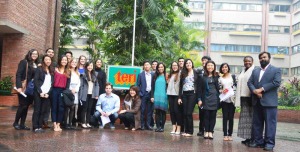We were given a warm welcome by The All India Management Association (AIMA) upon arrival to New Delhi. The Director General of AIMA, Ms. Rekha Sethi, gave us a broad-brush view of AIMA’s mission in working with the government, universities, and businesses. She also offered her personal views and solutions in bringing about change in India.
The following morning, we visited India Institute of Technology (IIT) New Delhi where the leading expert faculty in India presented their views on the topics of Energy, Water, and Waste Management and how IIT creates public awareness for social action. In the afternoon, we visited The Energy Resource Institute (TERI) where we learned a different definition of a smart city from three directors of the institute. Ms. Sethi’s dialogue with us gave us an in-depth breakdown on the overall issues within India’s infrastructures. In terms of building a smarter city, it is imperative to take into consideration the unique needs of different cities. That is, even with the rapid growth of technology, it is important to scale initiatives and plan at local levels when tackling the concept of smart cities.
 As the premier technology institute in India and a “dream destination” for most students, IIT strives to push beyond the standard boundaries of education and seeks real change. We were introduced to the Sampurna Approach to a Swachh (“Clean”) Delhi by Professor Gosain – an initiative undertaken to improve the environmental and living conditions of India. Currently IIT engineers are building a mobile application for the Indian community to communicate with companies within info-systems to make real time adjustments and real time results. I believe this notion of a Swachh Delhi is a step in the right direction. In order to build sustainable cities for the future, it is important for cities to collaborate with each other and share resources to bring the overall cost of goods down.
As the premier technology institute in India and a “dream destination” for most students, IIT strives to push beyond the standard boundaries of education and seeks real change. We were introduced to the Sampurna Approach to a Swachh (“Clean”) Delhi by Professor Gosain – an initiative undertaken to improve the environmental and living conditions of India. Currently IIT engineers are building a mobile application for the Indian community to communicate with companies within info-systems to make real time adjustments and real time results. I believe this notion of a Swachh Delhi is a step in the right direction. In order to build sustainable cities for the future, it is important for cities to collaborate with each other and share resources to bring the overall cost of goods down.
Meeting the three directors of The Energy Resource Institute (TERI) served as an inspiration for the potential of changing mindsets and social behavior within India. One of the three directors, Priyanka Kochhar stated that in order to build sustainable cities for the future there needs to be a shift in incentives. Rather than trying to simply target or focus incentives for those below the poverty line in changing their ways, it is important to not forget about the rich. Ms. Kocchar supports this idea with the example of rural villages that are not easily swayed to change their ways to a more feasible one for our environment. Although, if we tackle the other side of the spectrum, such that of the wealthy, then maybe it would be an unconventional way towards tackling the hardest issue at hand, changing mindsets and social behavior. TERI already has positioned themselves as a global company working towards building a more sustainable future.
by Isabelle Lee

